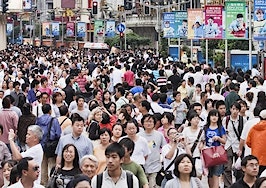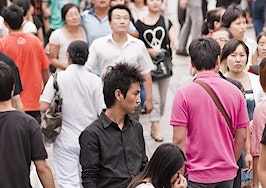- As a sign of respect, Chinese buyers like you to have visited their country before they will do business with you.
- If you operate in a good school district, network in education circles where you will meet cash-ready Chinese buyers.
- Be patient, relationships have to be allowed to develop so don't expect a deal immediately.
Over the past two years, Pacific Union CEO Mark McLaughlin has traveled to China from his head office in San Francisco six times, and he’s approaching his seventh visit.
He has learned a number things from these trips. For instance, the pollution in Beijing can be debilitating and, therefore, pleasant American cities have much to offer overseas buyers.
“The Chinese have a great appreciation for our air quality. There’s no way to understand that unless you have experienced it yourself,” he said.
The poor air quality comes from congestion in the cities. “Beijing has a population of 23 million and 8 million commute in every day,” McLaughlin noted.
Another thing he has learned in his travels are the subtle cultural differences in the way the Chinese communicate. “When someone nods their head, you think they agree, but they are just saying: ‘I heard you,’” he said.
CAR Expo panel session
McLaughlin was part of a panel speaking at the California Association of Realtors (CAR) Expo on Wednesday in a session called “The Influence of International Investors in California Real Estate.” The panel was moderated by John Wong, a CAR committee member and founding chairman of the Asian Real Estate Association of America (AREAA).
McLaughlin and his co-panelists — ChinaSF executive director Darlene Chiu Bryant and Gregory Karns, partner in the law firm Cox, Castle & Nicholson — gave the audience some tips for appealing to Chinese investors.
They warned Realtors not to expect to make a deal five minutes after they have met their Chinese client. These investors have to feel they know people well, and the relationship may take some time before trust is established.

aslysun / Shutterstock.com
In a bid to be accessible to Chinese homebuyers on their home turf, Pacific Union and its international affiliate, Christie’s International Real Estate, have set up a replica Chinese website, pacificunion.cn, written in Mandarin. It is hosted in China and has a full-time employee based in China who can respond to investor queries.
Why invest in Chinese buyers?
For McLaughlin, investing in high-net-worth Chinese buyers is well worth it because they are looking for higher-value properties than other demographics.
For the last 1,000 side trades at Pacific Union, purchases by local buyers averaged $1.3 million, and international buyers averaged $1.7 million in purchases — but Chinese purchases were $2.2 million. McLaughlin is poised for more growth from this market.
“Overall, 5 percent of our Bay Area business (side trades) come from Chinese buyers. I would expect this to grow to 7 to 8 percent in the next five years. We (also) have neighborhoods like Palo Alto where Chinese buyers are closer to 20 percent of our buy-side business,” added McLaughlin.
How overseas investors can affect markets
Session moderator John Wong discussed a point that often comes up: Are international investors driving up prices in the hot San Franciscan market?
It’s the cash-rich tech-boomers who send prices sky-high, not the Chinese, said Wong and Chiu Bryant.
[Tweet “Are international investors driving up prices in hot markets?”]
Chinese buyers may, however, dampen activity in some markets, warned McLaughlin. He has learned that they buy for generations ahead. In a popular Chinese buyer market like Palo Alto, California, 30 to 35 percent of the buyers are Chinese.
“If 30 to 35 percent are buying ‘generationally,’ they are not coming back to the market, which will impact sales,” said McLaughlin.
“Our culture in the U.S.A. has a real passion for ‘instant gratification.’ We tend to make home decisions for a five- to seven-year outlook,” he added.
New hot spots for overseas investors
The panel agreed that Chinese developers are becoming more sophisticated and adventurous about the U.S. market — and, in addition to looking at hot spots such as San Francisco, Los Angeles and New York, they are increasingly looking at opportunities in secondary and tertiary markets, including Dublin and Bakersfield, California.
“We are now starting to see interest in Oakland, and Uber’s recent announcement to expand in Oakland will 100-percent favor further interest from developers,” added McLaughlin.
Pacific Union recently set up a service business helping developers with floor design, interior finishing and phasing of developments. Called Pacific Union Marketing & Sales, it has both a local and a Chinese website.
[Tweet “Good hubs of education are a crucial draw when Chinese are seeking a home.”]
Good hubs of education, meanwhile, are a crucial draw when Chinese are seeking a home or a development opportunity in the U.S. “They don’t care if there is a Chinatown; they want their kids to assimilate,” said Chiu Bryant. And they will create their own community, she added.
Making contact
The ChinaSF executive director suggested: “At the university in your town, find out who the international student coordinator is and when is there going to be a parents’ orientation day.” Then go and network.
San Marino, California, which is near Pasadena, had been “taken over” by Chinese buyers because of the high school. “It’s a feeder into the university,” added Greg Karns.
Another piece of advice was to see if your city has a Chinese sister city and forge contacts that way.
Meanwhile, a vital stepping stone for U.S. agents is to visit China as McLaughlin has done. “You should go to China at least once or twice and get a feel of where they are coming from,” said Chiu Bryant.
Those new to the market should always go in a group, a business development group or a cultural exchange, said Wong.





